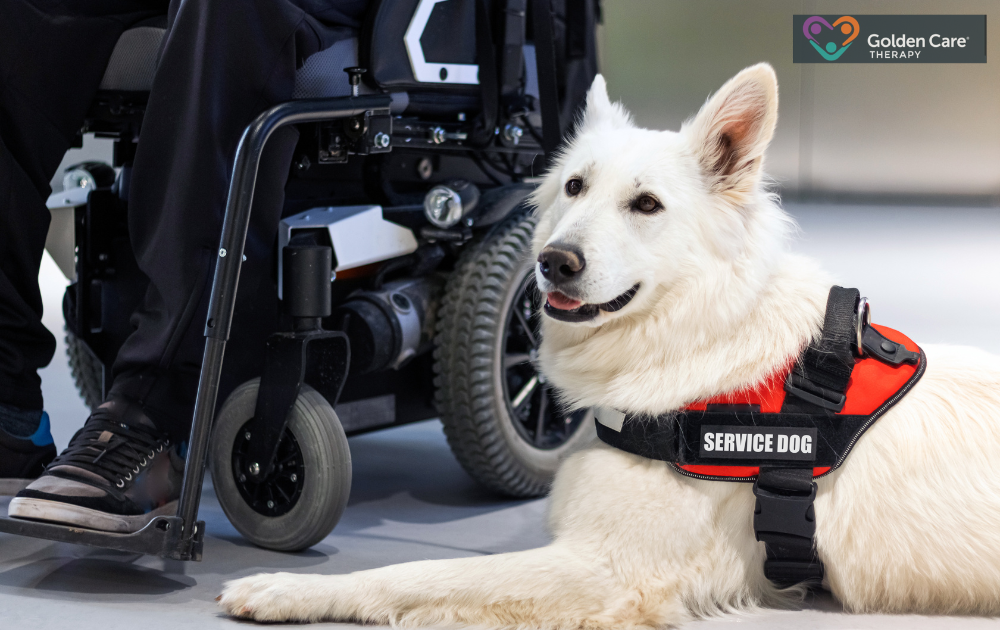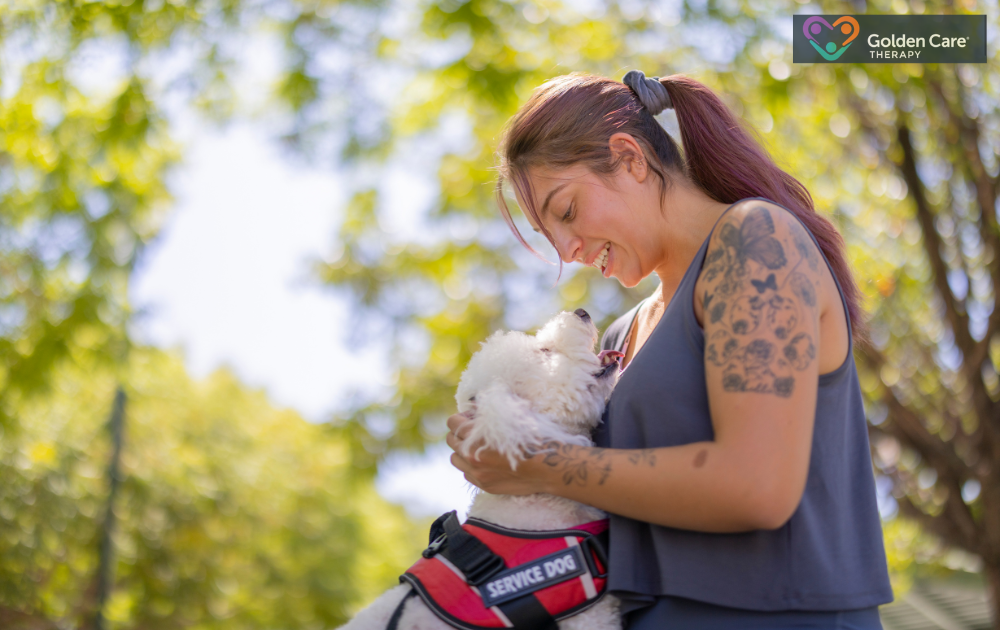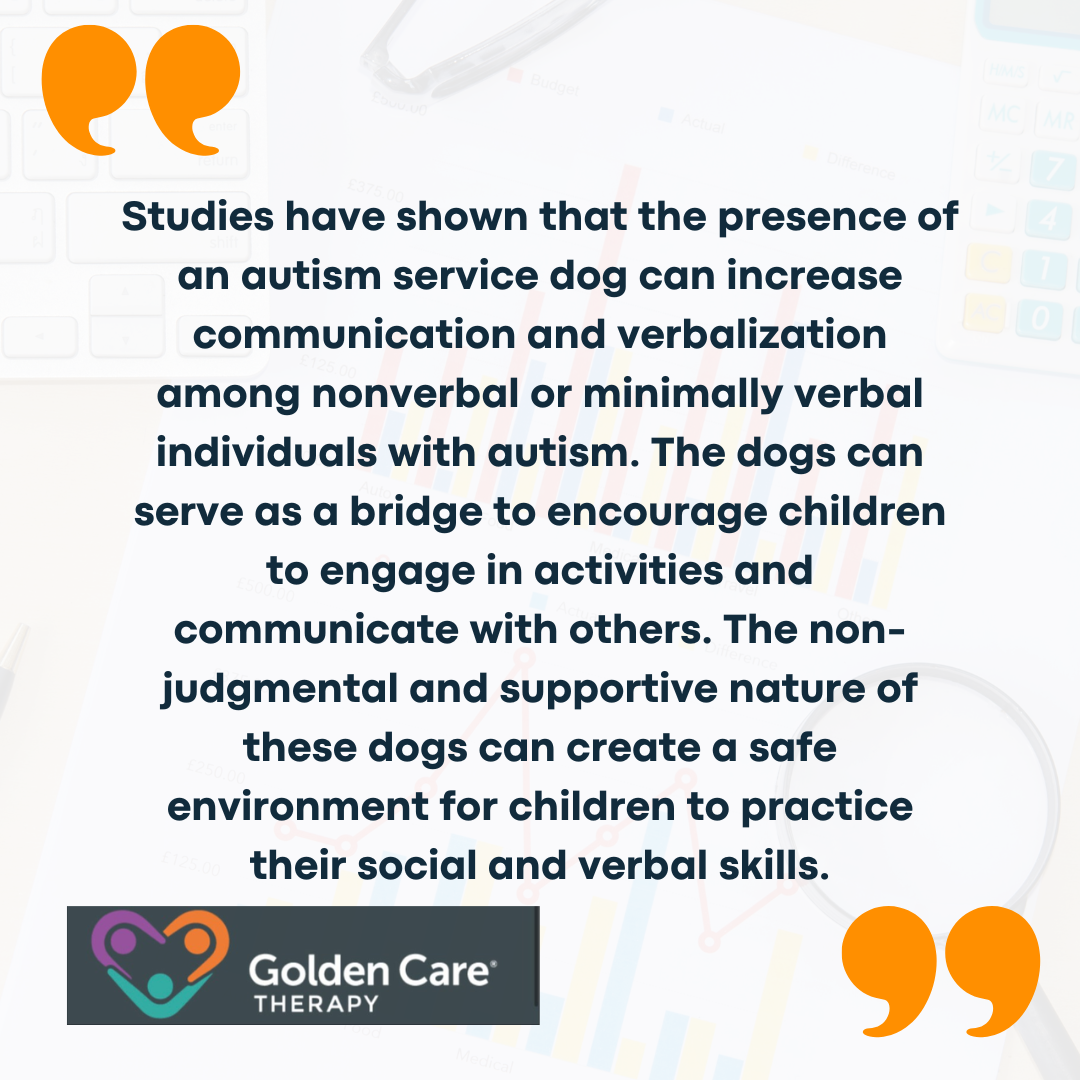Autism service dogs play a vital role in providing assistance and support to individuals with autism spectrum disorders (ASD). These specially trained dogs offer a range of benefits that can greatly enhance the lives of individuals with autism and their families.
Here, we’re going to go in-depth with the benefits that having a service dog offers to individuals with autism.

Safety and Security
One of the primary benefits of autism service dogs is their ability to increase safety and security for individuals with autism. These dogs are trained to be physically connected to the person with autism and follow commands from parents or caregivers. This physical connection helps prevent accidents or harm by reducing the likelihood of dangerous behaviors such as bolting or running away.
Autism service dogs provide a constant and vigilant presence, offering reassurance to both the individual with autism and their family. They can alert parents or caregivers to potential dangers and intervene in critical situations.
This increased safety and security can alleviate the anxiety and stress often experienced by individuals with autism and their families.
Emotional Support and Social Interaction
Autism service dogs also offer invaluable emotional support and facilitate social interaction for individuals with autism. These dogs can provide a calming presence, which can help minimize emotional outbursts and meltdowns.
Their comforting presence can offer security and stability which promotes emotional well-being.
Additionally, autism service dogs can serve as a bridge for social interaction. Children with autism may find it challenging to initiate and maintain social connections.
However, the presence of a service dog can act as a focus for the child, attracting the attention of other children and encouraging socialization. This interaction helps increase social and language skills, fostering improved communication and social bonds.

Arousal and Sensory Stimulation
Autism service dogs can have a positive impact on individuals with autism in the areas of arousal and sensory stimulation. These dogs are trained to recognize signs of sensory overload and provide a calming influence. Their presence can help regulate sensory input and reduce overstimulation, leading to improvements in these areas.
Furthermore, these service dogs can function as transitional objects. The bond between the child and the dog can serve as a source of comfort and companionship, allowing the child to develop a sense of security. This bond can extend to human interactions as well.
Improved Sleep and Stability
Sleep issues are common among individuals with autism, and adults are no exception.
Autism service dogs can play a crucial role in improving sleep patterns for adults by providing a sense of security and comfort at night. Their presence can help create a calming environment which can promote relaxation and better sleep quality.
Additionally, the stability and routine that come with caring for a service dog can positively impact the overall stability of the household, contributing to a more structured and balanced lifestyle.
Addresses Challenges in Daily Life
Daily life can present unique challenges for adults with autism, ranging from sensory sensitivities to difficulties with communication and routine.
Autism service dogs are trained to assist with these challenges, providing practical support and helping individuals navigate their daily routines. These intelligent animals can help with tasks such as reminding adults to take medications, providing grounding techniques during times of distress, and aiding in creating a structured environment.
Improves Social, Verbal, and Cognitive Skills
One of the significant benefits of autism service dogs is their ability to improve social, verbal, and cognitive skills in children with autism. These dogs serve as constant companions, providing unconditional love and acceptance. Their presence can help children feel more comfortable and confident in social situations, facilitating social interactions and reducing anxiety.

In addition to social and verbal development, autism service dogs can also have a positive impact on cognitive skills. The responsibility of caring for and interacting with the dog can enhance cognitive abilities such as problem-solving, memory, and attention.
Addresses Impulsive Behavior
Children with autism often struggle with impulsive behavior which can put them at risk in certain situations. Autism service dogs are trained to recognize and respond to these impulsive behaviors, providing a calming influence. By providing a sense of security and stability, these dogs can help reduce impulsive actions and keep children safe.
These dogs are trained to be vigilant and attentive to their human companions, alerting caregivers or teachers if the child engages in dangerous behaviors or tries to wander off. They can act as a physical barrier to prevent children from running into potentially harmful situations.
This constant supervision and support from the service dog can significantly reduce the risks associated with impulsive behavior.
Life Skills Development
Autism service dogs play a vital role in helping children with autism develop essential life skills. They can assist with activities of daily living, such as dressing, brushing teeth, and opening doors. By providing physical support and guidance, these dogs promote independence and self-confidence in children.
Moreover, the presence of a service dog can encourage children to engage in physical activities and exercise. Taking the dog for walks or playing with them can help improve motor skills, coordination, and overall physical fitness.
The bond between a child with autism and their service dog goes beyond the practical aspects of support. It fosters emotional connections, empathy, and responsibility. This bond can have a profound impact on the child’s emotional well-being which, in turn, can boost self-esteem and provide a constant source of companionship and comfort.

Considerations for Autism Service Dogs
There are several important factors to take into account when considering an autism service dog for an individual with autism. These considerations include the following:
Compatibility with Individuals
An important consideration when getting an autism service dog is the compatibility between the dog and the individual with autism.
Every person with autism is unique, so it’s crucial to find a dog that matches their specific needs and preferences. Some individuals with autism are naturally drawn to animals for comfort and interaction, making the presence of an autism service dog particularly beneficial.
It is important to assess the compatibility between the individual and the dog to ensure a positive and successful partnership.
Training and Care Requirements
Autism service dogs require specific training and care beyond that of a family pet. They undergo specialized training to learn how to assist individuals with autism in various situations. This training includes tasks such as tracking, grounding, and providing social skills support.
Additionally, these dogs must be well-behaved and obedient, responding to commands promptly and reliably.
In terms of care, autism service dogs require regular veterinary care, including vaccinations and check-ups, to ensure their health and well-being. They also need regular exercise to stay physically fit and mentally stimulated. Providing a healthy living environment, such as a safe and secure home, is essential for the dog’s overall well-being.
Therapeutic Benefits Beyond Support
While the primary role of an autism service dog is to provide support to individuals with autism, they can also offer therapeutic benefits beyond their assistance tasks. These dogs can help individuals with autism develop life skills, remain calm in stressful situations, engage in physical activities, improve social interaction, and stay safe.
The presence of a well-trained and supportive dog can significantly enhance the overall well-being and quality of life for individuals with autism.
Considering these factors when deciding to have an autism service dog can help ensure that the dog is a suitable match for the individual’s specific needs. It is important to remember that an autism service dog is not just a pet but a working partner who requires proper care, training, and understanding in order to meet the needs of individuals with autism.
If you’re seeking specialized ABA therapy in New Jersey, Indiana, Georgia, and New York, Golden Care offers comprehensive services tailored to meet the unique needs of each individual. Contact us to learn more or book a consultation today.
Sources:
https://www.bluebadgeinsurance.com.au/blog/autism-assistance-dogs
https://researchautism.org/blog/the-role-and-benefits-of-autism-service-dogs
https://udservices.org/why-choose-an-autism-service-dog
https://ellasanimals.org/tasks-and-work/autism-service-dog-tasks-work-and-benefits
https://www.autismparentingmagazine.com/therapy-dog-can-help



